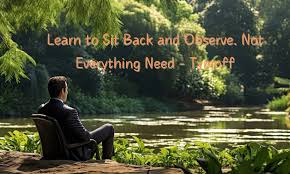Introduction
In a world that constantly demands our attention and reaction, the wisdom of sitting back and observing can often be overlooked. The phrase “learn to sit back and observe. not everything need – tymoff“. Not everything needs your reaction” resonates deeply in today’s fast-paced environment. It encourages mindfulness, patience, and a more reflective approach to life. This blog post will delve into the importance of adopting this mindset, how it can improve various aspects of your life, and practical steps to implement this philosophy.
Why Sitting Back and Observing Matters
Reduces Stress
Constantly reacting to every situation can be exhausting and stressful. By learning to sit back and observe, you give yourself the opportunity to process information calmly and thoughtfully. This approach can significantly reduce stress and anxiety, leading to a more balanced and peaceful life.
Enhances Decision Making
When you take the time to observe and reflect, your decision-making skills improve. You can analyze situations more thoroughly and consider multiple perspectives, leading to more informed and effective choices. This can be particularly beneficial in both personal and professional contexts.
Improves Relationships
Not everything needs a reaction, especially in interpersonal relationships. By observing rather than reacting immediately, you can better understand the emotions and motivations of others. This can lead to more empathetic and constructive interactions, reducing conflicts and fostering stronger relationships.
The Benefits of Observation
Increased Awareness
Observation allows you to become more aware of your surroundings, your thoughts, and your emotions. This heightened awareness can help you identify patterns and triggers, enabling you to respond more thoughtfully rather than impulsively.
Greater Self-Control
Sitting back and observing helps you develop greater self-control. Instead of being driven by immediate impulses, you learn to pause and choose your responses deliberately. This can enhance your self-discipline and resilience in various situations.
Enhanced Creativity
Taking a step back and observing can stimulate creativity. When you’re not caught up in the immediate need to react, your mind has the space to wander and explore new ideas. This can lead to innovative solutions and creative breakthroughs.
Practical Steps to Implement This Philosophy
Practice Mindfulness
Mindfulness involves being fully present in the moment and observing your thoughts and feelings without judgment. Incorporating mindfulness practices such as meditation, deep breathing, or simply taking a few moments each day to reflect can help you become more observant and less reactive.
Develop Patience
Patience is a key component of this philosophy. When faced with a situation, take a moment to pause and breathe before reacting. Remind yourself that not everything requires an immediate response and that sometimes, waiting can provide better clarity.
Reflect on Past Reactions
Take time to reflect on past situations where you reacted impulsively. Consider how a more measured response could have changed the outcome. Use these reflections to guide your future actions, helping you become more observant and less reactive.
Set Boundaries
Setting boundaries can help you create space to observe and reflect. This might mean limiting exposure to stressful situations or taking time for yourself to recharge. By establishing clear boundaries, you can protect your mental and emotional well-being.
Applying This Philosophy in Different Areas of Life
Personal Life
In your personal life, adopting this mindset can lead to more harmonious relationships and a more peaceful existence. Whether it’s dealing with family, friends, or personal challenges, taking a step back to observe can provide clarity and improve your interactions.
Professional Life
In the workplace, being observant rather than reactive can enhance your professional relationships and decision-making abilities. It allows you to handle conflicts more effectively, navigate complex situations with greater ease, and demonstrate leadership qualities by showing thoughtfulness and restraint.
Social Media and Technology
The rapid pace of social media and technology often encourages immediate reactions. By choosing to observe rather than react, you can engage more thoughtfully online, avoid unnecessary conflicts, and reduce the stress associated with constant connectivity.
Conclusion
“Learn to sit back and observe. Not everything needs your reaction” is a powerful reminder to embrace a more mindful and reflective approach to life. By reducing stress, enhancing decision-making, and improving relationships, this philosophy can lead to a more balanced and fulfilling life. Implementing practical steps such as practicing mindfulness, developing patience, reflecting on past reactions, and setting boundaries can help you adopt this mindset effectively. In a world that often demands immediate responses, the ability to sit back and observe is a valuable skill that can enhance your well-being and overall quality of life.

